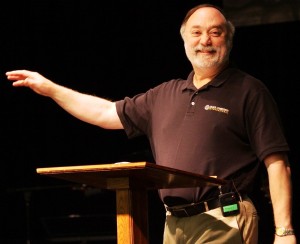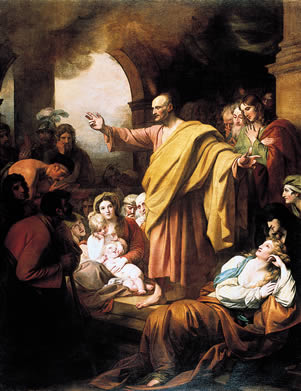Dear Brothers and Sisters in Christ,
 On the way out of church one Sunday, a young boy announced: ”Mommy, I’ve decided to become a minister when I grow up.” She replied, “That’s okay with us, but what made you decide that?” “Well,” said the little boy, “I have to go to church on Sunday anyway, and I figure it will be more fun to stand up and yell, than to sit and listen.”
On the way out of church one Sunday, a young boy announced: ”Mommy, I’ve decided to become a minister when I grow up.” She replied, “That’s okay with us, but what made you decide that?” “Well,” said the little boy, “I have to go to church on Sunday anyway, and I figure it will be more fun to stand up and yell, than to sit and listen.”
Thankfully, most of our pastors and other preachers are not into yelling, though I chuckle remembering being “yelled at” in sermons when I was growing up.
I’m reminded of another story about preaching: A boy was watching his father, a pastor, write a sermon. “How do you know what to say?” he asked. “Why, God tells me,” his father answered. The boy then asked, “So, why do you keep crossing things out?”

Certainly God puts in our hearts both the desire to preach and the content of the message, and yet we have our part to play—a part that certainly challenges us. When I sense God sharing something with me during times of study and meditation in Scripture, I often desire to share what I’m learning with others through a sermon or article. God, who desires to be known, uses our preaching to tell people about his nature, character, heart, mind and purpose as revealed and embodied in Jesus Christ. As Martin Luther said, “Beyond all the might and the power of the world and of all creatures, Christ proves his ability to draw the hearts of men to himself through the Word alone.” Our preaching should deliver God’s Word, the gospel, to God’s beloved children. In emphasizing the importance and power of that type of preaching, Martin Luther said this:
The lips are the public reservoirs of the church. In them alone is kept the Word of God… Unless the Word is preached publicly, it slips away. The more it is preached, the more firmly it is retained. Reading it is not as profitable as hearing it, for the live voice teaches, exhorts, defends, and resists the spirit of error. Satan does not care a hoot for the written Word of God, but he flees at the speaking of the Word (Luther’s Works, volume 18, p. 401).

Luther believed that the Holy Spirit was uniquely at work in the preaching of God’s Word. John Calvin held the same belief and emphasized a verse-by-verse, expository method. He would spend months preaching through books of the Bible. His series in Acts took more than three years. He gave 186 sermons in Corinthians, 353 in Isaiah and 200 in Deuteronomy. Now, I’m not recommending we do exactly as Calvin did. He preached ten times every two weeks, but most of us preach once a week at most. However, there is much to be said about having a thorough knowledge of Scripture—understanding who it is written to and what events were occurring when it was written, then keeping that knowledge under the umbrella of the most important exegetical question of all: Who is Jesus?
I marvel at what occurs between the delivery and reception of a sermon. The ideas the preacher seeks to convey sometimes are quite different from what an individual listener receives. On several occasions someone thanked me for “the very clear point” they heard in my sermon. When they describe that point, I wonder if they heard what I actually said! It’s not that they weren’t listening, or were hearing what they wanted to hear. God had a message just for them. That God often works in this way is one of the reasons I spend a lot of time in prayer during sermon preparation.
When I preach, I seek to follow Jesus’ method of using stories, humor and drama, with references to common practices of contemporary culture. Story-telling is one of the most effective tools in preaching. I seek to faithfully communicate the expository background/context of the passage, then illustrate the application of its main point by telling a relevant story. Though listeners may not remember all the background, they will often remember the story and its main point.

by Benjamin West
The church’s founding fathers, who also were preachers, tended to tell stories to effectively communicate the message of the gospel. In the book of Acts and the Epistles we find Peter, John and Paul sharing stories of their personal journey with Jesus. We also find this narrative approach in the sermons of such notable preachers as John Chrysostom (the “golden mouth” preacher), Martin Luther, John Calvin, John Wesley, John Knox, George Whitefield, Jonathan Edwards, Charles Spurgeon and David Martyn Lloyd-Jones.
Though none of us are famous preachers, our sermons still are of great value, particularly when well-prepared. In his book for preachers, Between Two Worlds, John Stott says it takes at least 12 hours to prepare an effective sermon. Though many of our preachers are unable to devote that much time, I urge us all to make sermon preparation a high priority. As noted above, that includes time in prayer.
Effective sermons clearly communicate the gospel and leave the audience wanting more. Many of us have experienced a child squealing with delight when we lift them into the air and spin them around. Their first response is often, “Do it again!” So we lift and twirl them again, only to hear, “Do it again!” and again and again. When we tire and put them down, they still call out for more. Effective preaching is like that. When we tell the story and make our point, people respond with, “Tell us more!”
Jesus exhorts us to embrace a child’s wide-eyed enthusiasm and trust that wants more and more of God’s Word. There have been many times when I’ve heard a sermon that was 90 minutes or longer, but because it was so captivating, seemed only a few minutes long. Then there were other sermons that after only 10 minutes felt like two hours! That’s why I remind preachers that it’s better to finish with the audience wanting more, than to have them wish they had left early.
I thank our pastors and other preachers for their labor of love in giving effective sermons. Let us all remember that when we preach, we have opportunity to share the exciting, encouraging, powerful, inspiring and life-giving good news (gospel) of God grace. Concerning that grace, note this from T.F. Torrance:
Grace is to be understood as the impartation not just of something from God but of God Himself. In Jesus Christ and in the Holy Spirit, God freely gives to us in such a way that the Gift and the Giver are one and the same in the wholeness and indivisibility of His grace.… (Reality and Evangelical Theology, pp. 14-15).
When people come to church, they need to hear from God about that grace. They need to hear about God’s love, and about how, in love, he works to change them from the inside out, and works to transform the entire world, often in hidden ways. As we bring this word (the gospel), through our preaching, I believe “the peace of God, which surpasses all understanding” (Philippians 4:7, NRSV) will be released into people’s lives. As a result, an energy and trust to live faithfully despite temptations and trials will be fostered in them by the Spirit. I pray you will not become weary in this vital task, and that together we will co-minister with Jesus, setting up signs of his kingdom through the effective preaching of his Word.
Now it’s time for me to get to work on my next sermon…
Preaching the Word with you,
Joseph Tkach
PS: Dan Rogers is putting together a course in preaching at Grace Communion Seminary. It takes a while for new courses to be developed and approved. We’ll let you know when this new course is first offered.
Note: the three paintings above are public domain via Wikimedia Commons.



This is a very powerful and inspiring message from the President. It speaks volumes, in a nutshell, about grasping God’s word. I will certainly save it as a PDF file for future reference. I am currently enrolled as a GCS student. I look forward to the inclusion of this new course in “preaching” at GCS, in the immediate future.
Al
One early morning in a bakery of pandesal (bread for breakfast) with lots of customers waiting for the bread to get cooked, a lady beside me started to openly share her concerns & anxieties about her children. I have thought of how can I help her that moment. But surprisingly this is what transpired.:) I started talking to her and share how God loves her & her children. That we can practice in our daily walk the kind of love God has for us, to “bless those who curse us”. It is a great opportunity to participate with Jesus in His ministry when we try our best to do the same with our children & with other people in their worst attitude, instead of reacting violently. We train ourselves to bless them as well. The more we practice to bless, the more we experience the real joy, peace & contentment. We live an abundant life when we abundantly love others.:) this is how we seek God’s kingdom. I reminded her the word..”seek first the kingdom & all things shall be added.:)
She was teary eyed when I told her that I have to go ahead because I have my bread ready, she suddenly stood up & said “where do you live? Can I get your contact #? Can i visit you in your house? Can you leave later awhile? I want to hear more of what you shared to me.”:)
I thought of sharing this story when mr tkach said, people respond with, “tell us more”..:)
Their are a lot lot more to share to people about the truly good news.:)